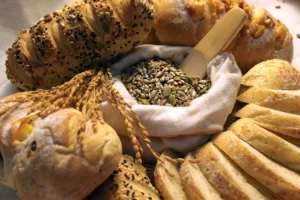Revealed: 5 nutrition lies you’ve DEFINITELY heard
You know how hard it is to escape health myths – there’s always a new trend diet or news story circulating. The truth is, while some of these myths have some truth to them, they are often misunderstood, mis-portrayed, or simply wrong. Here on the Dr. Gundry channel, our goal is to help each and every one of you live your healthiest life, even if it means debunking the most popular healthy myths once and for all.
That’s why we’ve created a new video that tackles some of these myths that may be holding you back from better health. Trust us, it’s better to hear it now than to realize it 20 years from now. And don’t worry, it’s not all bad news! You might be pleasantly surprised to learn that some delicious foods you were told to avoid are actually great for your health.
- In the world of nutrition, it’s hard to escape the countless myths and lies that are constantly circulating. Whether it’s the latest trendy diet or an alarming news story, there’s always something new to confuse us. But don’t worry, the Dr. Gundry channel is here to help. In a new video, Dr. Gundry tackles five nutrition lies that you’ve definitely heard before and sets the record straight. From debunking myths about electrolytes to revealing the truth about egg yolks and breakfast, Dr. Gundry is here to provide you with accurate information about your health. So, if you’re tired of being misled by popular myths, tune in to this video for some surprising revelations.
Myth 1: You need electrolytes after you workout
After a strenuous workout, you may have heard that you need to replenish your electrolytes. However, the truth is that synthetic electrolyte drinks are unnecessary. While sports drinks are often marketed as essential for hydration and recovery, they are actually loaded with sugar. This can counteract the benefits of your workout and leave you feeling drained. Instead of relying on these drinks, it’s important to understand that the need to replenish electrolytes depends on the intensity and duration of your workout, as well as your overall diet. If you’ve had a particularly intense workout and find yourself feeling light-headed or loopy, you may consider adding a little salt to your water or consuming a hard-boiled egg with salt. These options provide a natural boost without the added sugar.

Myth 2: Egg yolks are bad for you
Another common nutrition myth is that egg yolks are bad for you due to their cholesterol content. However, eating food with high cholesterol does not directly lead to high cholesterol levels in your body. In fact, discarding the egg yolk means getting rid of the healthiest part of the egg. Egg yolks contain essential nutrients, vitamins, minerals, and healthy omega fats. They provide valuable benefits to your overall health and wellbeing. Instead of opting for an egg white omelet, consider including more egg yolks in your meals to maximize the nutritional value of your eggs.

Myth 3: Breakfast is the most important meal of the day
You may have always been told that breakfast is the most important meal of the day. However, skipping breakfast does not necessarily lead to an unhealthy life. The truth is that the timing of when you eat is not as important as what you eat. While breakfast can be a delicious and nutritious start to your day, it’s not necessary to have a big meal first thing in the morning. In fact, intermittent fasting has gained popularity for its potential benefits in weight loss and longevity. This approach involves alternating between periods of eating and fasting, allowing your body to adapt and optimize its functions. So, don’t feel pressured to eat breakfast every day if it doesn’t fit your lifestyle. Listen to your body and find a routine that works for you.

Myth 4: You should eat as few carbs as possible
Carbohydrates often get a bad reputation when it comes to nutrition. While it’s true that certain carbs, such as refined sugars and processed grains, can have negative effects on your health, it is not necessary to completely eliminate carbs from your diet. In fact, there is no such thing as a no-carb diet that provides a well-balanced nutritional intake. Many nutritious foods, including leafy greens, cruciferous vegetables, and fruits, contain carbs. These foods are rich in vitamins, minerals, and fiber, and can contribute to a healthy diet. It’s important to choose the right carbs and prioritize whole, unprocessed sources while limiting your intake of unhealthy carbs.

Myth 5: Coffee is bad for your health
Coffee enthusiasts can rejoice in knowing that coffee is not inherently bad for your health. In fact, coffee is rich in polyphenols, which have been linked to various health benefits. Coffee consumption has been associated with improved focus, energy, and blood sugar regulation. However, the negative reputation of coffee often stems from the added sugars, dairy, and artificial flavorings found in many coffee drinks. These additions can turn a healthy beverage into a sugary calorie bomb. Instead, opt for black coffee or explore healthier alternatives such as using unsweetened coconut milk, natural sweeteners like Stevia or cinnamon, and adding fresh spices for flavor. By making mindful choices, you can enjoy the benefits of coffee without the drawbacks.

In conclusion, it’s important to separate fact from fiction when it comes to nutrition myths. Synthetic electrolyte drinks are not necessary for hydration and can be loaded with sugar. Egg yolks are not bad for you and offer valuable nutrients. Breakfast is not necessarily the most important meal of the day, and intermittent fasting can be a beneficial approach. Carbs are not the enemy, but choosing the right ones is crucial. Coffee itself is not bad for your health, but added sugars and artificial flavorings in coffee drinks should be avoided. By understanding the truth behind these myths, you can make informed decisions about your nutrition and live a healthier life.
